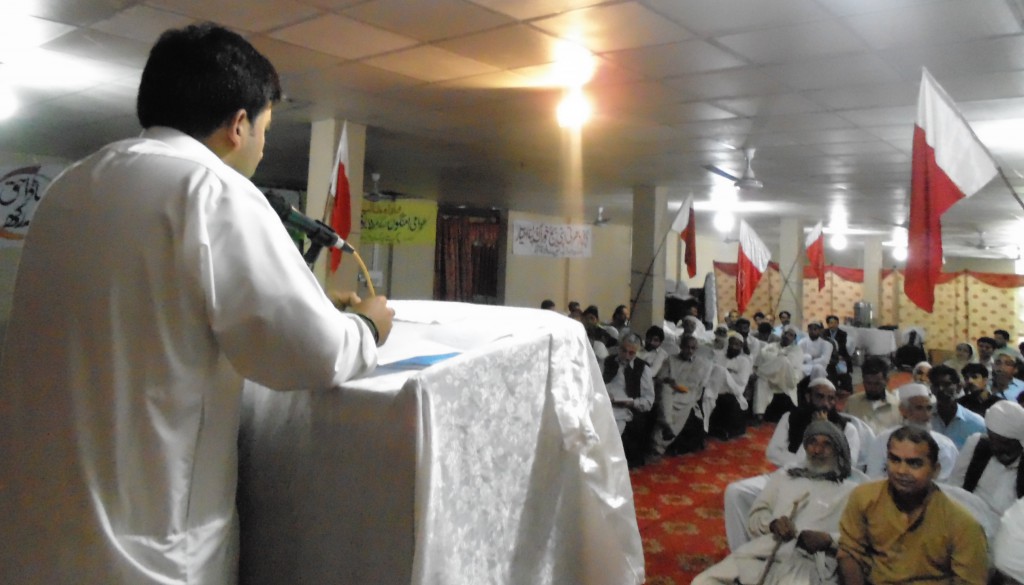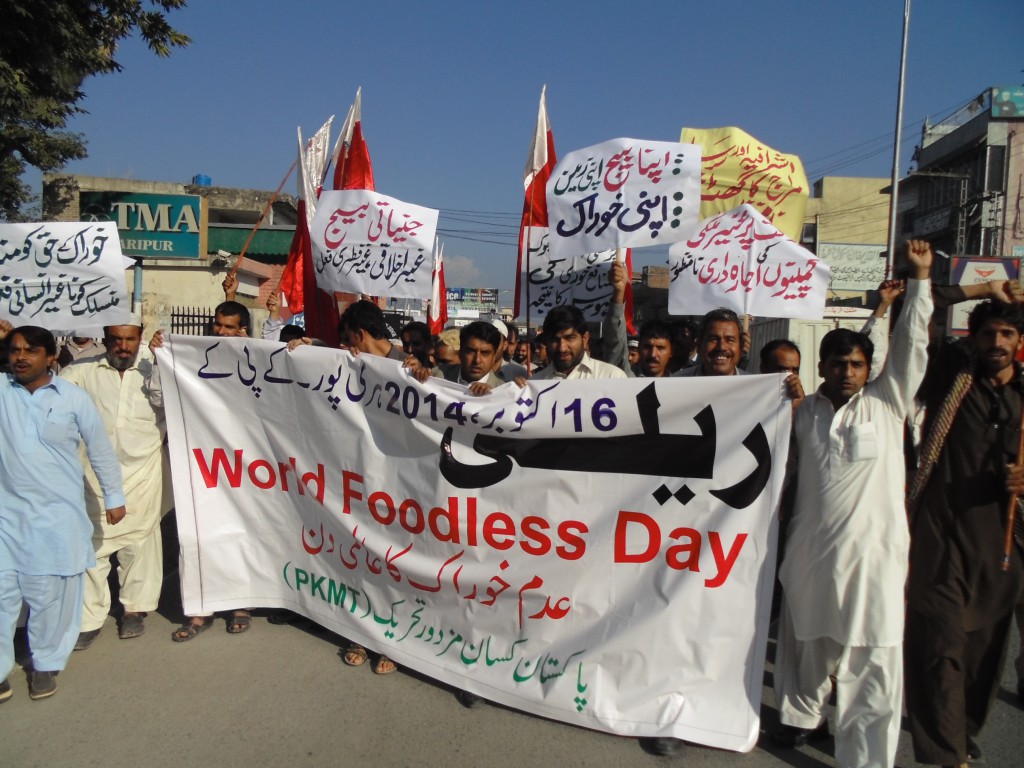October 16, 2014
The Pakistan Kissan Mazdoor Tehreek’s Khyber Pakhtunkwa Chapter held its
provincial assembly in Haripur, Khyber Pakhtunkwa. The theme was “*Apna
Beej Ugae Gae, Companiyo ko Bhagaye Gae* (We Will Grow Our Own Seeds, and
Chase Away Corporations)! No to the Draft Seed Act”. More than a 100
farmers gathered from various distrits to attend the Assembly which had
been held on October 16, celebrated by the Food and Agriculture
Organization (FAO) as the World Food Day. But for many years the day has
been marked as the World Foodless Day by Asian peasants, and PKMT also
marked it as the World Hunger Day.
Many of the PKMT leaders including Raja Mujeeb, National Coordinator, Tariq
Mahmood, Provincial Coordinator KPK, Provincial Coordinator Punjab Zahoor
Joya and Reham Nawaz, District Coordinator Haripur spoke at the assembly.
According to them, the world continues to suffer from hunger and
malnutrition because of extreme inequities in land distribution and more
and more control over agricultural production held by mega transnational
corporations.
Raja Mujeeb stated though the world food production was more than adequate,
but due to corporate led food production and distribution system, the world
in general, and Pakistan in particular is facing rising levels of food
insecurity. According to the draft Food and Nutrition Security Act, 60% of
households suffer from food insecurity; nearly 13.5 million children suffer
from different forms of malnutrition. According to Zahoor Joya, in a
country that was basically agrarian such high levels of hunger were
criminal; the government was accountable for the miserable situation of the
people.
Tariq Mahmood stated it was important to point out the immense control
being given to corporate agriculture was a major reason for rising hunger
in the country. The draft national seed act is an indication of the power
that transnational corporations hold in the making of the Pakisani
agriculture policy. The draft National Seed Act is actually to implement
the requirements of the Trade-related Aspects of Intellectual Property
Rights (TRIPs) Agreement of the World Trade Organization (WTO). Today,
nearly all hybrid and genetically modified seeds are owned by global
corporations of which Monsanto, Syngenta, Dow, Dupont, Bayer, and BASF are
the most powerful. The tabled seed act would allow only these mega
corporations to produce, and sell these seeds in the country. No farmer,
unless he/she files for registration would be allowed to grow seeds.
Azra Talat Sayeed, Roots for Equity provided a background on the corporate
control over seeds and the development of hybrid, high-yielding seeds and
now the introduction of the genetically modified seeds. She provided
information on the monopolistic profit seeking agenda of mega corporations
and their tightening grip over agricultural production.
Wali Haider, Root for Equity stated that if such a seed law was allowed in
the country, it would mean that farmers would be totally dependent on
corporations to provide them seed which could at any time result in seed
shortage leading to food shortages, hunger and famine.
Hakim Gul a PKMT activist from Sindh, narrated the very difficult situation
of peasants under feudalism where massive tracts of land were owned by a
handful of feudal lords. Peasants were forced to work on their land using
very expensive, chemical intensive agricultural inputs. As a result
peasants were living in acute poverty and indebtedness, barely being able
to afford two meals a day. All this was because of feudalism and now the
increasing corporate control in agriculture. Farmers across Sindh did not
have seeds today. Hakim Gul stressed that point that “we have grown and
produced the highest quality of seeds in this region for the past 7,000
years. Why should we the farmers of the Indus Valley Civilization give over
the control of our agriculture system to monopolistic imperialist
corporations? Reham Nawaz stated PKMT demands food sovereignty!”
Fayyaz Ahmed, PKMT member from Hattar provided the details of land grabbing
that was taking place in his area. He highlighted the role of the
parliamentarians in aiding and abetting the various schemes through which
land was grabbed. Instead of using land that was not being used for
agriculture, prime agriculture land has been taken by force.
In the open forum, Abdul Rasheed a farmer from Mansehra defined sustainable
agriculture. He stated that he was keeping his own seeds. He even had his
own oxen and refused to be dependent on chemical inputs such as urea and
DAP. According to him this was what sustainable agriculture meant. Another
landless peasant from Peshawar, Lal Jan stated that “the demands of PKMT
were equity and justice; we demand abolishing feudalism and corporate
control over our lands. It is a fight for justice. No doubt it will take
time but we will meet with success. No matter what our spoken language is,
farmers and workers are all one, and we are united.”
The Assembly passed the following resolutions:
1. The Federal Government must immediately stop further action on the
Draft Seed Act and take it back;
2. The control held by transnational corporations on Pakistani
Agricultural must be taken back;
3. Chemical intensive industrial agricultural production must be
replaced by biodiversity-based sustainable agriculture;
4. An equitable distribution of land must be implemented demolishing
feudalism;
5. The government should provide all support to small and landless
farmers so that they have control and access to land, seeds and other
productive resources;
6. Women must have equal space as farmers and small producers and have
the same rights as their counterparts;
7. All decision making with respect to agricultural production and
marketing must be in the hands of the small producers, enabling food
sovereignty;
At the end of the Assembly, the Pakistan Kissan Mazdoor Tehreek and Roots
for Equity took out a protest rally.
Released by: Pakistan Kissan Mazdoor Tehreek (PKMT) and Roots for Equity
Download the Press Release PKMT Provincial Assembly, October 2014


